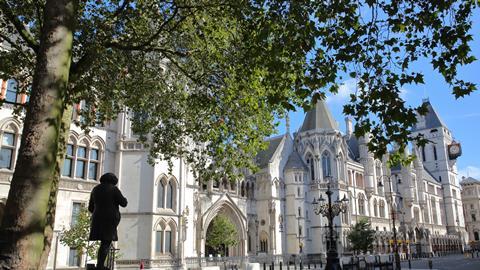The High Court has begun hearing a landmark challenge that could potentially see appeals to school exclusions – an area of the education sector in which children who are black and/or have special educational needs and disabilities are overrepresented – brought within the scope of legal aid.
The case, which is being heard by Mr Justice Lavender, concerns the lack of legal aid for appeals before the Independent Review Panel, a specialist body that reviews the lawfulness of permanent exclusions.
Garden Court Chambers’ Stephanie Harrison KC, for the claimant, told the court that none of the case law to date has had to grapple with two important contexts in the treatment of young people who face and are subject to permanent exclusions: the 'discriminatory and disproportionate use of this very significant power' and the 'significant adverse consequences' in terms of access to education, quality of education, and social stigma.
'Access to justice - that is what this case is about in this very sensitive and important area,' Harrison said.
The court was taken to witness statements submitted by the claimant's solicitor, Sabrina Simpson, in which she noted that Institute for Public Policy research estimates that 77% of children excluded from school have special educational needs and are seven times more likely to be excluded than their peers. Children from black Caribbean backgrounds are five times more likely to be excluded than their peers. Department for Education data published in July 2023 found that of the 18 ethnicity groups identified, white and black Caribbean pupils and black Caribbean pupils had the third and fourth highest permanent exclusion rates.
Harrison said children permanently excluded from school can be stigmatised and parents 'hope to be able to pursue proceedings in the Independent Review Panel to remove that stigma even if that child is not going to go back to that school'. Official evidence suggested a 'concerning and depressing link between the risk of criminal exploitation and entering the criminal justice system for children excluded from school'.
Mr Justice Lavender's decision 'will have an impact on those seeking funding for representation in what can be a vitally important legal process', Harrison said. The claimant's legal team 'want to take the opportunity to clarify the scope and extent of possible circumstances in which legal aid would be afforded for those seeking to challenge exclusions before the Independent Review Panel'.
The hearing continues.
The claimant is represented by Garden Court Chambers’ Stephanie Harrison KC and Ollie Persey, instructed by Coram Children’s Legal Centre.
MIND, which intervened in the case, is represented by Garden Court Chambers’ Grace Brown and Nadia O’Mara, instructed by MIND’s in-house legal team.
The director of legal aid casework is represented by Brick Court Chambers’ Malcolm Birdling and Joshua Pemberton. The lord chancellor is represented by Blackstone Chambers’ Shane Sibbel.





























